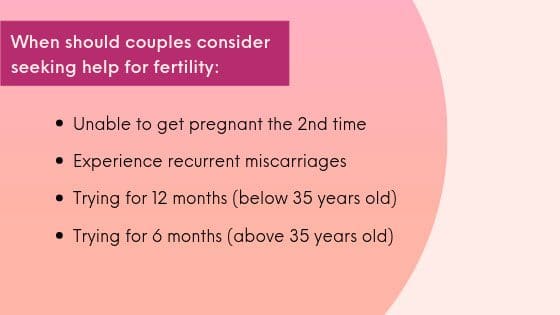On 21st September, SMG Women’s Health hosted a workshop, “Baby-making. Here we go!”, which talked about pre-pregnancy care tips alongside male fertility knowledge for couples planning on embarking the parenthood journey. Here’s a quick re-cap for those who didn’t manage to join us!
We had Dr. Kanika from Astra Women’s Specialist Centre, Ms Vernadine Goh, a pharmacist from Guardian and Dr Fong Yang from Astra Centre for Women & Fertility as our speakers for the day.
Pre-pregnancy Care
Dr Kanika, whose clinical interest includes early and/or high risk pregnancies shares 4 main points on pre-pregnancy care, including what to do while trying to conceive.
Vaccinations |
Get the necessary vaccinations against potential diseases such as Rubella, Chicken Pox and Hepatitis B before pregnancy for maternal and fetus safety. |
Supplements |
Women who are planning on getting pregnant should start taking folic acid supplements when trying to conceive as it helps to prevent neural tube defects in the foetus, such as the brain and spine. |
Medical Disorders |
Those with existing medical disorders, examples listed below, to seek medical advice from their Obstetricians and Gynaecologists before getting pregnant.
|
Lifestyle |
No smoking and alcohol as it decreases the chances of pregnancy.
Exercise regularly and having a balanced diet is important to help maintain a healthy BMI. As fertility declines with the age of the mother, women should bear in mind their age when it comes to family planning. Also, for couples who are trying to conceive, using home ovulation kits are helpful to identify when your fertile window is. |
| Vaccinations | Get the necessary vaccinations against potential diseases such as Rubella, Chicken Pox and Hepatitis B before pregnancy for maternal and fetus safety. |
|---|---|
| Supplements | Women who are planning on getting pregnant should start taking folic acid supplements when trying to conceive as it helps to prevent neural tube defects in the foetus, such as the brain and spine. |
| Medical Disorders | Those with existing medical disorders to seek medical advice from their Obstetricians and Gynaecologists before getting pregnant.
|
| Lifestyle | No smoking and alcohol as it decreases the chances of pregnancy.Exercise regularly and having a balanced diet is important to help maintain a healthy BMI.As fertility declines with the age of the mother, women should bear in mind their age when it comes to family planning. Also, for couples who are trying to conceive, using home ovulation kits are helpful to identify when your fertile window is. |
Supplements for Pre-pregnancy
Next up, Ms Vernadine Goh, a pharmacist from Guardian Singapore shares with us about supplements available in pharmacies and what to choose. When planning for pregnancy, or during pregnancy, the nutritional needs increase and getting the right nutrients is crucial in ensuring good health in the infant.
Ms Goh breaks it down into 5 core supplements:
Supplement |
Benefits |
Folic acid |
Reduces neural tube defects in pregnancy. |
Iron |
Reduce risk of Iron Deficiency Anemia in mothers. Iron needs also increase from the 2nd trimester onwards for mummy and baby, so it’s helpful to ensure there is sufficient intake of iron right from the start. |
Calcium |
Calcium has been proven to reduce the risk of pre-eclampsia in women. Insufficiency in calcium intake can also lead to osteoporosis im a woman’s later years. |
Omega 3 Fatty Acids |
Helps reduce the chance of premature birth and increase birth weight. |
Probiotics |
Improve gut problems such as bloating, constipation and reduce incidence of eczema in early childhood after childbirth. |
| Supplement | Benefits |
|---|---|
| Folic acid | Reduces neural tube defects in pregnancy. |
| Iron | Reduce risk of Iron Deficiency Anemia in mothers. Iron needs also increase from the 2nd trimester onwards for mummy and baby, so it’s helpful to ensure there is sufficient intake of iron right from the start. |
| Calcium | Calcium has been proven to reduce the risk of pre-eclampsia in women. Insufficiency in calcium intake can also lead to osteoporosis im a woman’s later years. |
| Omega 3 Fatty Acids |
Helps reduce the chance of premature birth and increase birth weight. |
| Probiotics | Improve gut problems such as bloating, constipation and reduce incidence of eczema in early childhood after childbirth. |
Male Fertility
While women are usually the ones seeking help for fertility, Dr Fong Yang, an IVF Clinician who treats both female and male fertility, debunks the myth that fertility is a lady’s problem. He mentions that ⅓ of the delays in being able to conceive (also medically known as subfertility) are male-related.
Understanding your sperm quality
For men, your fertility can be easily assessed through a semen analysis, which assesses 3 main qualities of the sperms – the number of sperms (sperm count), morphology (sperm structure) and motility (sperm movement). If necessary, there are more detailed tests to assess the DNA of the sperms.
Lifestyle/ Habits that can affect sperm quality
As a couple prepares for pregnancy, it is not only the ladies who have to ensure that they have a healthy lifestyle. Men must also do their part in terms of weight control and not smoking. Having too high a BMI could indicate a high level of fat in the body, which could cause estrogen release. This affects the sperm production negatively. Smoking on the other hand damages DNA in the sperms. Hence, even if the sperm reaches the egg successfully for fertilisation, it might not result in a healthy embryo for a successful pregnancy.
Treatment options for men with fertility issues
For men with low sperm count or low quality sperm count, there are assisted reproductive methods such as Intrauterine Insemination (IUI) and In-Vitro Fertilisation (IVF) to help with getting pregnant successfully.
Lastly, when should couples consider seeking help for fertility?







